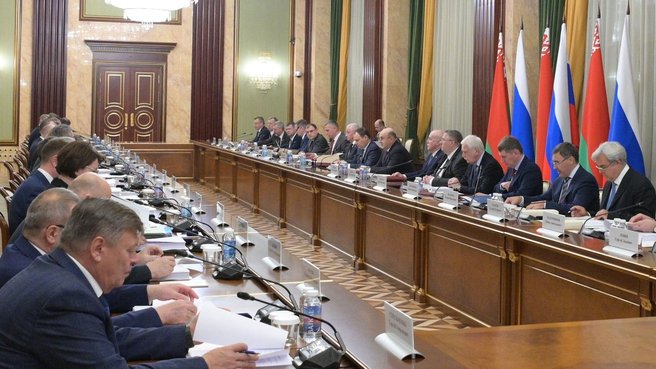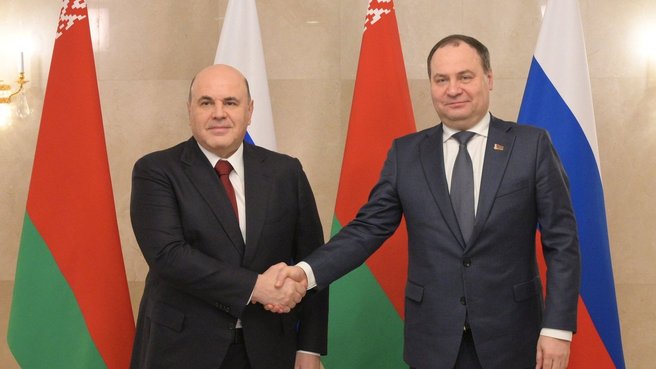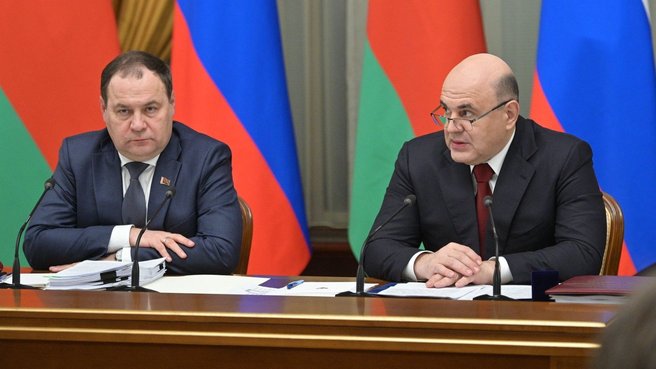Prime Minister of the Russian Federation and Chairman of the Union State Council of Ministers Mikhail Mishustin co-chaired a meeting of the Union State Council of Ministers with Prime Minister of the Republic of Belarus Roman Golovchenko.
Mikhail Mishustin’s opening remarks
Roman Golovchenko’s opening remarks
Excerpts from the transcript:
Mikhail Mishustin: Mr Golovchenko, Mr Mezentsev, friends.
We are glad to welcome you to Moscow at a regular, second meeting of the Council of Ministers of the Union State. It is very important that Russia and Belarus continue developing their integration efforts. We are consistently reaching the goals set for us by our presidents – Vladimir Putin and Alexander Lukashenko. First, this applies to strengthening direct people-to-people and business-to-business ties.
Today, we are undergoing a very responsible stage – we are about to complete our work on the Guidelines for Implementing the Treaty Establishing the Union State and the 28 sectoral union programmes. We will also outline new objectives for the 2024–2026 timeframe.
We have carried out the majority – over 90 percent – of more than 990 coordinated events. We have also laid the foundation for pursuing a common macro-economic, industrial and agricultural policy, establishing a common transport market, formulating competition rules, creating a legal space for businesses and our citizens and ensuring equal opportunities for consumers.
Overall, we have drafted 200 regulations and already adopted 140 of them.
We have put into operation five information systems that allow us to track the movements of cars and other goods.
We have established an Interstate Customs Centre that is ensuring seamless interaction between the relevant Russian and Belarusian services. Almost everything is ready for launching a supranational tax committee. It will monitor the implementation of the treaty which sets forth the general principles of indirect taxation. It will also control the transfer of information on taxpayers to the integrated indirect tax administration platform.
We can see the specific results of integration between the Union States. The economic partnership between Russia and Belarus is strengthening, which is particularly significant amidst the unlawful sanctions against our countries.
Over the first three quarters of this year, Russian-Belarusian trade grew by another 8 percent to almost 3.25 trillion Russian roubles. We have every reason to believe that we will be able to break last year’s records in mutual trade.
Subsequently, the accumulated positive effect for the Belarusian economy after complete implementation of all union programmes is estimated at 120 billion Russian roubles per year, which should factor into the additional growth of the republic’s GDP by around 2 percent.
We will continue to consistently remove the existing barriers in mutual trade, create favourable conditions for our companies to access both markets. We will particularly pay attention to supporting small and medium-sized businesses and creating new jobs in manufacturing industries.
What is especially important is that our integration solutions consist of tangible measures that help achieve our technological independence, among other things. A year ago, in November, we signed an agreement on granting Belarus a loan of 105 billion Russian roubles to fund joint investment projects that are highly relevant in industrial manufacturing, energy, the transport sector, timber production, microelectronics, aviation engineering and in IT.
Today it is necessary to develop a regulatory framework that will specify standard requirements for product localisation. We enjoy extensive cooperation in the energy industry. One milestone event took place earlier this month. On 1 November, we signed a delivery and acceptance statement for the second unit of the Belarusian Nuclear Power Plant. This is our largest joint project with strategic potential. It will substantially improve environmental conditions and stimulate further development of knowledge-intensive industries. The power plant is already operating in normal mode and has produced over 20 billion kWh of energy. Nuclear and radiation security were contained at the highest standards. Russia will continue to provide the necessary assistance for the plant’s operation and fuel needs.
The substantial experience in this high-technology field provides an excellent foundation for further joint projects, primarily in the associated areas of nuclear medicine, energy storage systems, digitisation and many others.
Colleagues, we will be marking important anniversaries and celebrating our shared past next year. This includes 80 years since Belarus was liberated from the Nazi invaders and 25 years since the signing of the Treaty Establishing the Union State.
Our nations share the same cultural, spiritual and moral values, and overall, we value our traditional friendship.
This meeting’s agenda includes an item on offering humanitarian aid to students and education institutions in the Donetsk and Lugansk people’s republics on behalf of the Union State.
Overall, we reaffirm our commitment to further strengthening our humanitarian ties. In late September, we came together at the Government’s Coordination Centre with our Belarusian colleagues and held a dedicated strategic session to discuss this important topic in all its aspects.
Russian agencies have selected and put forward 30 forward-looking proposals to step up our ties in research, education, culture, sports and tourism, without forgetting, of course, healthcare and social services as well as consumer rights protection. It is essential that we deliver on all these plans for the benefit of our people.
Forging deeper region-to-region ties is the next major track in our cooperation agenda. I would like to convey my wholehearted gratitude to our Belarusian colleagues for their dedication to this effort, and personally to you, Mr Golovchenko, and of course to Alexander Lukashenko. You have visited many regions this year, and we support this proactive approach.
In particular, in June, Ufa hosted the 10th Regions Forum. More than 80 Russian regions have already established trade and economic ties with Belarus. Our companies have signed some 4,500 foreign trade contacts with their partners in Belarus worth over 100 billion roubles.
Friends, we have a packed agenda in front of us. Today, we will be reviewing a draft document titled Guidelines for Implementing the Treaty Establishing the Union State for the Next Three-Year Cycle.
It includes ten sections covering goals related to coordinating macroeconomic and tax policies, as well as industrial and agricultural policies, expanding cooperation in the customs sector, creating a common financial market and a unified energy market, as well as stepping up our ties in many other sectors.
At the end of the day, these efforts must pave the way to improving the quality of life for our people and offering more opportunities for our businesses.
In addition to this, during today’s meeting we will review our priorities as part of the Union State Strategy for Promoting Research and Technology. This includes offering better education for those working in innovation as one of the current subjects. During our face-to-face meeting earlier today, Mr Golovchenko and I had a detailed conversation on the programmes we can undertake for this. This is instrumental for asserting and reinforcing our technological sovereignty and ensuring that our economies have the qualified specialists they need. Of course, we need to outline the way we will work together on this matter.
Colleagues, we will submit the most important resolutions coming out of this meeting to the presidents of Russia and Belarus – Vladimir Putin and Alexander Lukashenko. I am certain that the outcomes we achieve today will serve as an impetus for promoting integration and enhancing the multifaceted cooperation between our brotherly nations.
It is with all my respect that I have the honour to pass the floor to Mr Golovchenko.
Go ahead, please.
Roman Golovchenko: Mr Mishustin, Mr Mezentsev, meeting participants.
The fact that we are holding the second in-person meeting of the Council of Ministers of the Union State this year undoubtedly speaks to closer Belarusian-Russian integration and matches the two countries’ commitment to comprehensive expansion of cooperation in the new geopolitical circumstances.
We can clearly see that external attempts to disrupt our efforts to build the union have failed, as have many others. Belarus and Russia stand together and confidently stay the constructive course set by the leaders of our countries.
The macroeconomic indicators of Russia and Belarus confirm that both countries are on a path of sustainable growth. All branches of vertical power in both countries are aimed at expanding Belarusian-Russian strategic cooperation. The respective governments have ensured systematic interaction between relevant sectoral bodies. Joint programmes and integration investment projects for which 23 certificates have been approved are being implemented, as Mr Mishustin mentioned. A mechanism for mutual confirmation of implementation of technological operations and verification is being developed. Measures aimed at stimulating production and sales are being implemented as well.
This year alone, joint assembly plants and new agricultural machinery production facilities have been built in the Krasnodar Territory, the Novosibirsk Region, and Tatarstan. A new plant for the production of grain dryers with a Belarusian manufacturer has launched in Bashkortostan. The assembly of grain harvesters and carriers based on a chassis made by the Minsk Automobile Plant has started in the Krasnodar Territory. The construction of Belarus, a new multi-brand centre to sell, maintain, and repair Belarusian equipment, has begun. The number of stores selling Belarusian clothing, footwear, furniture, food, and so on is expanding in Russia.
The presence of Russian businesses in Belarus is also expanding at a similarly fast pace. In addition to conventional exhibitions, an increasing number of new platforms are being opened to facilitate communication between businesses.
The most recent examples include an international investment forum on import substitution called “Made in Russia” which took place in Mogilev in October and the recently concluded International Business Week in Ufa.
In the first half of the year, the volume of Russian investment in the real sector of the Belarusian economy increased by a third compared to the previous year and accounted for more than 60 percent of all foreign investment.
In the context of import substitution programmes, Russian companies are actively placing orders for the production of components, assemblies, units and finished products with Belarusian enterprises.
This, Mr Mishustin, is just a fraction of our accomplishments resulting from our collaborative and engaged efforts that cover the entire territory of the Russian Federation.
I will provide just a couple of figures to back up the thesis you have outlined. This year, Belarus was visited by 87 delegations of various levels from Russian regions. Of these, 34 were led by the heads of Russian regions. In turn, 96 Belarusian official delegations and 136 delegations from business circles visited Russian regions. As you noted, I personally visited 11 Russian regions, some of them twice.
Considering this, Mr Mishustin, I suggest that you follow my example. All Belarusian regions will be happy to welcome you and members of the Russian Government.
Mikhail Mishustin: Thank you.
Roman Golovchenko: I would also like to note that the negotiation format between our deputy prime ministers, Alexei Overchuk and Nikolai Snopkov has been effective, as was the High-Level Group of the Union State Council of Ministers.
This year, the HLG considered more than 40 aspects of Belarusian-Russian relations and functioned as a headquarters for taking prompt measures to boost our economies and strengthen relations.
The Union State Council of Ministers did not slow down either. This year, we have adopted more than 40 new legal acts. I think Mr Mezentsev will report on this in more detail.
Due to the measures taken, Belarus has been able to make up for more than 80 percent of its lost exports to unfriendly countries.
You mentioned mutual trade, Mr Mishustin. I think that by the end of the year, it will certainly surpass last year’s record figures. But we cannot stop there. We need to lay the groundwork for the year ahead today.
I believe that with the effort we are making now, we will be able to renew our historical highs every year.
I believe that, thanks to the hard work on implementing the 28 Union State programmes we have also mentioned here, these initiatives not only confirmed their strategic expediency, but also produced very concrete and down-to-earth economic results. The two countries have developed a single rule of access to public procurement, a single rule of competition and counteraction to mala fide practices, and ensured the free movement of goods, works and services across the Union State. We have harmonised the conditions on the transport and telecoms markets, and completed the integration of information systems for the traceability of goods, transport control, veterinary and phytosanitary control.
Two new bodies of the Union State have been formed: the supranational tax committee and the Interstate Customs Risk Management Coordination Centre. Russia and Belarus signed a number of significant bilateral agreements including a customs cooperation agreement, an agreement on the general principles of indirect taxation, and several important intergovernmental agreements in very specific areas, such as technological operations, road transport, microelectronics, the machine tool industry, bank guarantees, and so on.
And of course, one of the most significant results of this year’s joint projects was the Belarusian nuclear power plant, where the second power unit began operation; Mr Mishustinov has spoken at length about this. I can only confirm that the nuclear power plant was built using the most cutting-edge technologies and safety systems. We are very pleased with the project’s results and are looking forward to more projects in partnership with Rosatom State Corporation in the future.
The list of mutual achievements could go on for a long time, so I will probably focus on our long-term goals.
Experts have prepared a draft of new Guidelines for the implementation of the Treaty on the Creation of the Union State for the next three years. It is an organic continuation of the existing integration package that also includes the Union State programmes and is aimed at further promoting the convergence of the parties’ legal frameworks, ensuring the functioning of a united energy market and the unified transport system, pursuing a common industrial policy, a coordinated agricultural policy, a coordinated tax policy, forming a single research and technology landscape, a common information space, and upholding equal rights of all citizens of the Union State in the social sphere.
We must work diligently to ensure that our efforts to integrate the industrial policies of the two countries yield real, tangible results. We need to remove all barriers in terms of our shared ability to access each other’s procurement and subsidies, as well as agree on a single set of measures for protecting the Union State’s internal market as a way to expand our cooperation links and expand our joint efforts to manufacture products with a high degree of localisation.
We need to set ambitious goals in pursuing these objectives. I believe that the most challenging sections along this road are already behind us, and we delivered on these tasks in a commendable manner. Moving on, we need to undertake system-wide measures to boost our technological independence by nurturing homegrown solutions that would be better than their foreign equivalents. In this connection, we must deliver on a whole host of objectives to create a single IT landscape for the Union State and prioritise our own research and technology, as well as promote our own software.
I know that Mr Mishustin is a major proponent of this policy and has been enthusiastic in supporting it. It would not be an exaggeration to call him its main driving force. I stand ready and will do my best to join you in these efforts since I believe that this is one of the cornerstones of the Union State’s technological and overall security.
The mutual recognition of digital signatures would serve as a major impetus for creating a single digital space. I am certain that we can work our way towards signing an international treaty to this effect before the end of this year.
The Government is also focusing on proposals to offer direct flights between Russia’s million-plus cities and the capital of Belarus. I strongly believe that this undertaking will not only help us increase tourist numbers, but will also promote business-to-business ties in various sectors and segments.
We would never succeed in our efforts to improve the lives of our people without ensuring food security. In this context, we must step up our efforts to create a legal framework for carrying out an effective and coordinated agricultural policy within the Union State.
Friends, today’s meeting reflects the commitment by the governments of our countries to engage in a wide-ranging effort to strengthen and develop the Union State. This meeting’s agenda covers topical items. I am certain that the agreements we reach today and the resolutions we adopt will be followed by specific steps by our two governments and will fully materialise.















